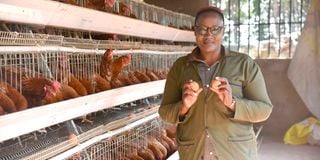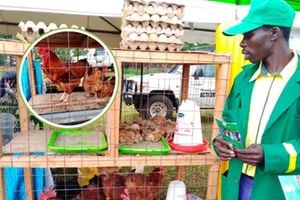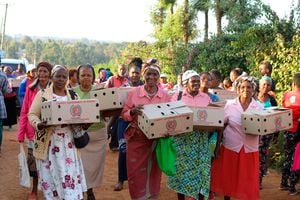
Milkah Nyamache explains the advantages of battery cage system in poultry farming.
Experts are raising concerns about the cage system in poultry keeping, arguing that it distresses the animals and restricts their freedom to natural behaviour.
The systems lack nesting opportunities, leading to frustration for many birds when laying eggs, they say.
Dr Elynn Njeri, a veterinarian at the Africa Network for Animal Welfare (ANAW), says studies have shown no clear legislative frameworks govern poultry farming in Kenya, giving farmers freedom to use cages.
“We’ve conducted assessments with farmers, examining their production chains, including transport, slaughter and what they consider as welfare,” Dr Njeri says.
According to her, caging increases the risk of antimicrobial resistance (AMR), posing a threat to public health.
She cautions that improper antibiotic use in poultry, especially when farmers fail to follow veterinary prescriptions, fuels the rise of drug-resistant pathogens that may be passed on to humans.
“It is important that farmers administer the correct antibiotics and consult animal health service providers for accurate diagnoses. Misusing antibiotics allows pathogens to develop resistance,” she says.
“Once chickens retain microbial residues, consumers are at risk of developing AMR.”
AMR occurs when bacteria or other pathogens become resistant to antibiotics, making standard treatment ineffective.
“When we misuse antibiotics, pathogens develop resistance and antibiotics fail to cure ordinary illnesses,” Dr Njeri adds.
She was referring to findings from a pilot project and assessment conducted with farmers in several counties. The pilot identified gaps in animal welfare throughout the poultry production chain.
In Keroka, Milkah Nyamache uses cages to manage 2,000 chickens. According to Nyamache, the system has brought many important changes, including reducing conflicts with neighbours.
“I have always been passionate about poultry farming. My parents did this and settled paid our school fees,” she says.
“Compared to other farming ventures, poultry is easier.”
The method is known to increase egg and meat production. Nyamache says she went for cages due to limited land in Keroka.
“There are no large farms in Kisii and Nyamira counties. If you rear chickens on free range, you are likely to be in conflict with neighbours as the birds wander into their compounds. To prevent this, I had to confine my birds,” she says.
“This modern confinement system saves on space and it is easy to identify sick birds and collect eggs without challenges.”
Even with this method, Nyamache ensures her chickens are in a well-ventilated area and can move without difficulties.
“They need to walk and play. I have set aside an area they go to before returning to their designated rooms. When building the cages, we ensured the rooms had enough fresh air and light. Egg-laying chickens need 14 hours of light every day,” Nyamache says.
She gets 60 crates of eggs daily from her farm. Nyamache markets the eggs on Facebook, WhatsApp, TikTok and other social media platforms, expanding her reach.
“My customers are in Kisii, Kericho, Oyugis, Keroka and Ahero,” Nyamache says.
In Dagoretti South, Nairobi County, Mary Nduta adopted the deep litter system to her manage 2,500 chickens. Production peaks during festivities like Easter and Christmas.
Nduta says she has heard of farmers who use antibiotics in excess.
“When chickens get sick, the farmers overdose them with antibiotics so they recover fast. I advise those farmers to follow guidelines from veterinary officers,” Nduta says.
Nduta provides her birds with vitamin supplements like M1, which she says help combat harmful bacteria and support digestion. She sells her chickens to wholesalers.
“Good food and clean water ensure the birds are healthy. In times of extreme cold, I use cloths to keep them warm,” she adds.
Nduta started the venture with 2,400 chicks and is full of praises for the deep litter system.
“Not everyone can be a good poultry farmer. I ensure few people get in contact with my birds to minimise the risk of diseases,” she says.
Dr Dennis Bahati, a veterinary surgeon at ANAW, encourages farmers to create an environment that prioritises animal welfare. He says, chicken farmers in general, need to take in the advise as the birds are the most widely kept animals for protein.
“Chickens are a vital source of proteins for the rich and poor alike the world over. To increase productivity and meet the demand for this key protein, farmers must prioritise the welfare of chickens,” Dr Bahati told Seeds of Gold.
“Chickens are important and their freedom is also essential. They will never let you down if you take care of them properly.”









